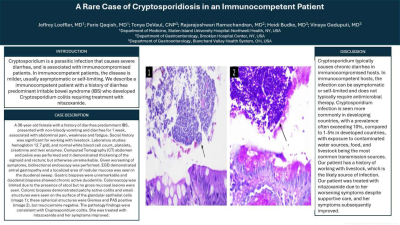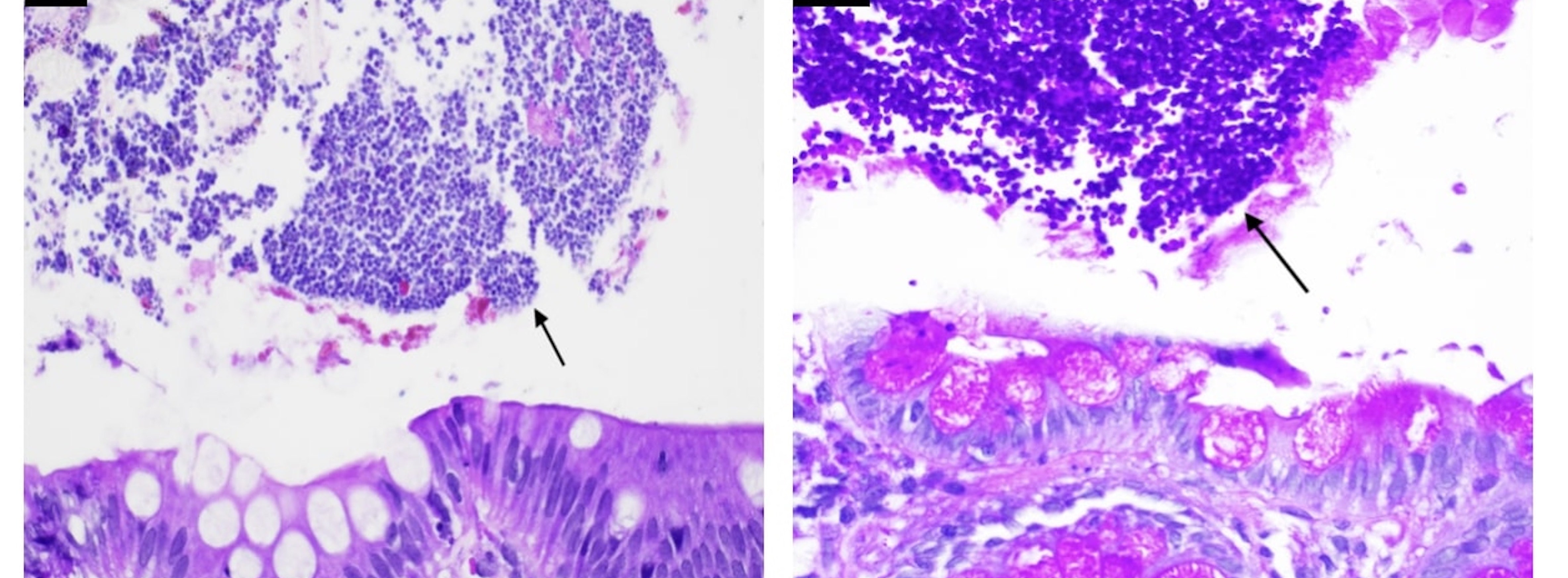Tuesday Poster Session
Category: Colon
P3702 - A Rare Case of Cryptosporidiosis in an Immunocompetent Patient
Tuesday, October 29, 2024
10:30 AM - 4:00 PM ET
Location: Exhibit Hall E

- JL
Jeffrey Loeffler, MD
Staten Island University Hospital
Staten Island, NY
Presenting Author(s)
Jeffrey Loeffler, MD1, Faris Qaqish, MD2, Tonya DeVaul, 3, Rajarajeshwari Ramachandran, MD4, Heidi Budke, MD3, Vinaya Gaduputi, MD3
1Staten Island University Hospital, Staten Island, NY; 2Staten Island University Hospital, Northwell Health, Staten Island, NY; 3Blanchard Valley Health System, Findlay, OH; 4Fresno Veterans Affairs Medical Center, Fresno, CA
Introduction: Cryptosporidium is a parasitic infection that causes severe diarrhea, and is associated with immunocompromised patients. In immunocompetent patients, the disease is milder, usually asymptomatic or self-limiting. We describe a immunocompetent patient with a history of diarrhea predominant irritable bowel syndrome (IBS) who developed Cryptosporidium colitis requiring treatment with nitazoxanide.
Case Description/Methods: A 36-year-old female with a history of diarrhea predominant IBS, presented with non-bloody vomiting and diarrhea for 1 week, associated with abdominal pain, weakness and fatigue. Social history was significant for working with livestock. Laboratory studies: hemoglobin 12.7 g/dL and normal white blood cell count, platelets, creatinine and liver enzymes. Computed Tomography (CT) abdomen and pelvis was performed and it demonstrated thickening of the sigmoid and rectum; but otherwise unremarkable. Given worsening of symptoms, bidirectional endoscopy was performed. EGD demonstrated antral gastropathy and a localized area of nodular mucosa was seen in the duodenal sweep. Gastric biopsies were unremarkable and duodenal biopsies showed chronic active duodenitis. Colonoscopy was limited due to the presence of stool but no gross mucosal lesions were seen. Colonic biopsies demonstrated patchy active colitis and small structures were seen on the surface of the glandular epithelial cells (image 1); these spherical structures were Giemsa and PAS positive (image 2), but mucicarmine negative. The pathology findings were consistent with Cryptosporidium colitis. She was treated with nitazoxanide and her symptoms improved.
Discussion: Cryptosporidium typically causes chronic diarrhea in immunocompromised hosts. In immunocompetent hosts, the infection can be asymptomatic or self-limited and does not typically require antimicrobial therapy. Cryptosporidium infection is seen more commonly in developing countries, with a prevalence often exceeding 10%, compared to 1-5% in developed countries, with exposure to contaminated water sources, food, and livestock being the most common transmission sources. Our patient has a history of working with livestock, which is the likely source of infection. Our patient was treated with nitazoxanide due to her worsening symptoms despite supportive care, and her symptoms subsequently improved.

Disclosures:
Jeffrey Loeffler, MD1, Faris Qaqish, MD2, Tonya DeVaul, 3, Rajarajeshwari Ramachandran, MD4, Heidi Budke, MD3, Vinaya Gaduputi, MD3. P3702 - A Rare Case of Cryptosporidiosis in an Immunocompetent Patient, ACG 2024 Annual Scientific Meeting Abstracts. Philadelphia, PA: American College of Gastroenterology.
1Staten Island University Hospital, Staten Island, NY; 2Staten Island University Hospital, Northwell Health, Staten Island, NY; 3Blanchard Valley Health System, Findlay, OH; 4Fresno Veterans Affairs Medical Center, Fresno, CA
Introduction: Cryptosporidium is a parasitic infection that causes severe diarrhea, and is associated with immunocompromised patients. In immunocompetent patients, the disease is milder, usually asymptomatic or self-limiting. We describe a immunocompetent patient with a history of diarrhea predominant irritable bowel syndrome (IBS) who developed Cryptosporidium colitis requiring treatment with nitazoxanide.
Case Description/Methods: A 36-year-old female with a history of diarrhea predominant IBS, presented with non-bloody vomiting and diarrhea for 1 week, associated with abdominal pain, weakness and fatigue. Social history was significant for working with livestock. Laboratory studies: hemoglobin 12.7 g/dL and normal white blood cell count, platelets, creatinine and liver enzymes. Computed Tomography (CT) abdomen and pelvis was performed and it demonstrated thickening of the sigmoid and rectum; but otherwise unremarkable. Given worsening of symptoms, bidirectional endoscopy was performed. EGD demonstrated antral gastropathy and a localized area of nodular mucosa was seen in the duodenal sweep. Gastric biopsies were unremarkable and duodenal biopsies showed chronic active duodenitis. Colonoscopy was limited due to the presence of stool but no gross mucosal lesions were seen. Colonic biopsies demonstrated patchy active colitis and small structures were seen on the surface of the glandular epithelial cells (image 1); these spherical structures were Giemsa and PAS positive (image 2), but mucicarmine negative. The pathology findings were consistent with Cryptosporidium colitis. She was treated with nitazoxanide and her symptoms improved.
Discussion: Cryptosporidium typically causes chronic diarrhea in immunocompromised hosts. In immunocompetent hosts, the infection can be asymptomatic or self-limited and does not typically require antimicrobial therapy. Cryptosporidium infection is seen more commonly in developing countries, with a prevalence often exceeding 10%, compared to 1-5% in developed countries, with exposure to contaminated water sources, food, and livestock being the most common transmission sources. Our patient has a history of working with livestock, which is the likely source of infection. Our patient was treated with nitazoxanide due to her worsening symptoms despite supportive care, and her symptoms subsequently improved.

Figure: Image 1: Histology image showing small structures on the surface of the glandular epithelial cells (black arrow) - Cryptosporidium
Image 2: Cryptosporidium organisms demonstrating positive PAS stain (black arrow)
Image 2: Cryptosporidium organisms demonstrating positive PAS stain (black arrow)
Disclosures:
Jeffrey Loeffler indicated no relevant financial relationships.
Faris Qaqish indicated no relevant financial relationships.
Tonya DeVaul indicated no relevant financial relationships.
Rajarajeshwari Ramachandran indicated no relevant financial relationships.
Heidi Budke indicated no relevant financial relationships.
Vinaya Gaduputi indicated no relevant financial relationships.
Jeffrey Loeffler, MD1, Faris Qaqish, MD2, Tonya DeVaul, 3, Rajarajeshwari Ramachandran, MD4, Heidi Budke, MD3, Vinaya Gaduputi, MD3. P3702 - A Rare Case of Cryptosporidiosis in an Immunocompetent Patient, ACG 2024 Annual Scientific Meeting Abstracts. Philadelphia, PA: American College of Gastroenterology.
